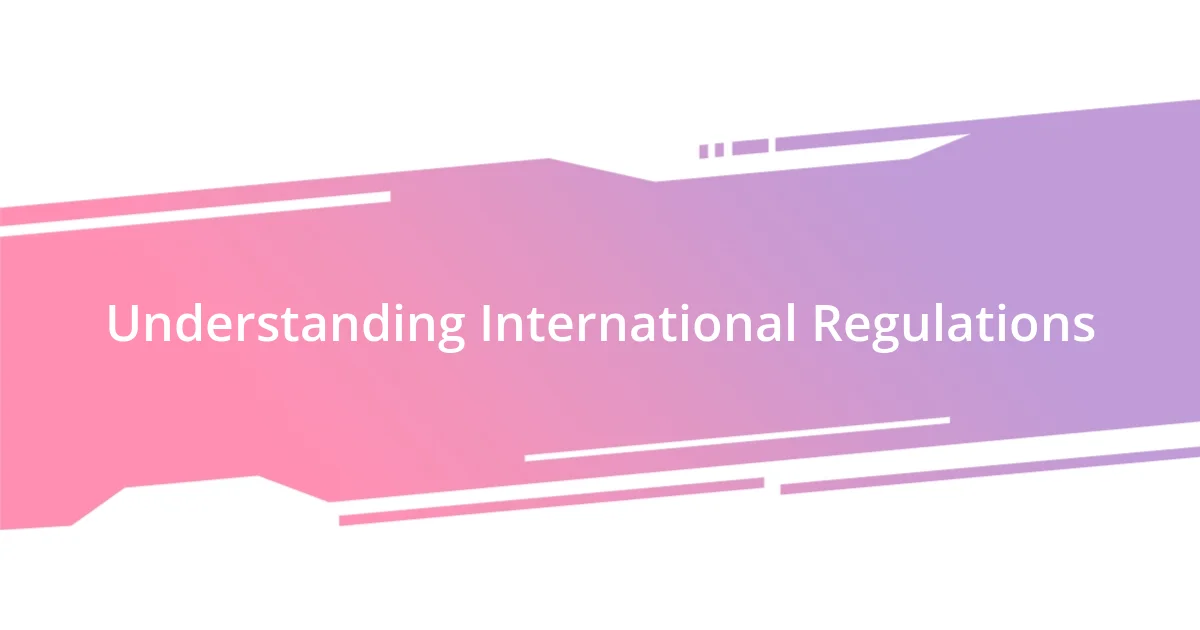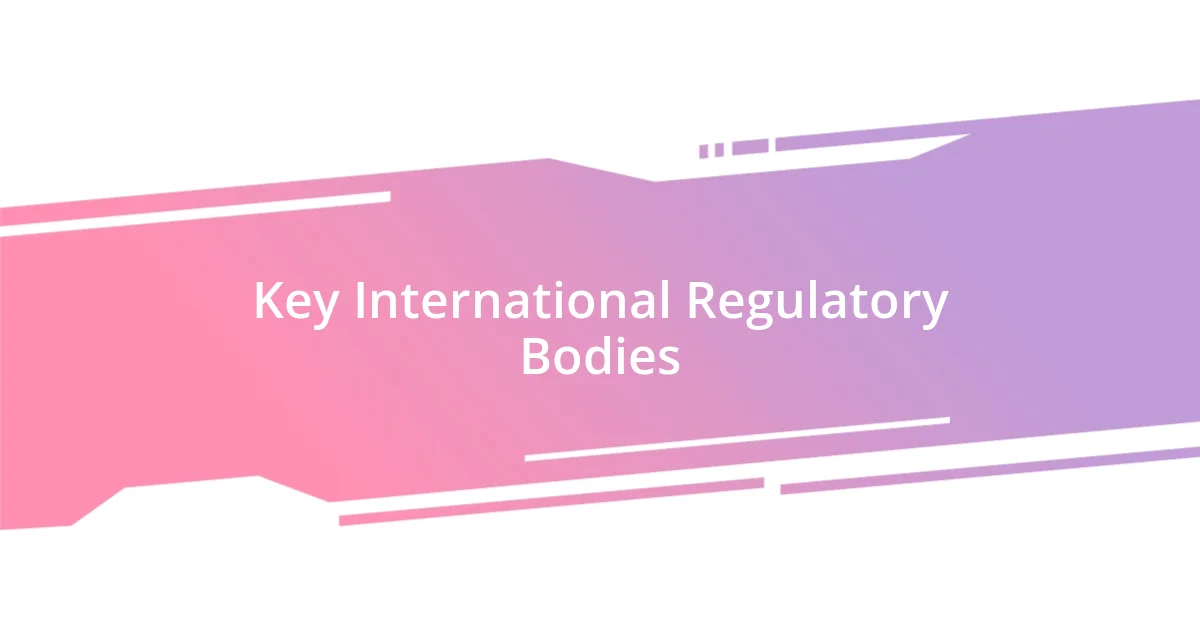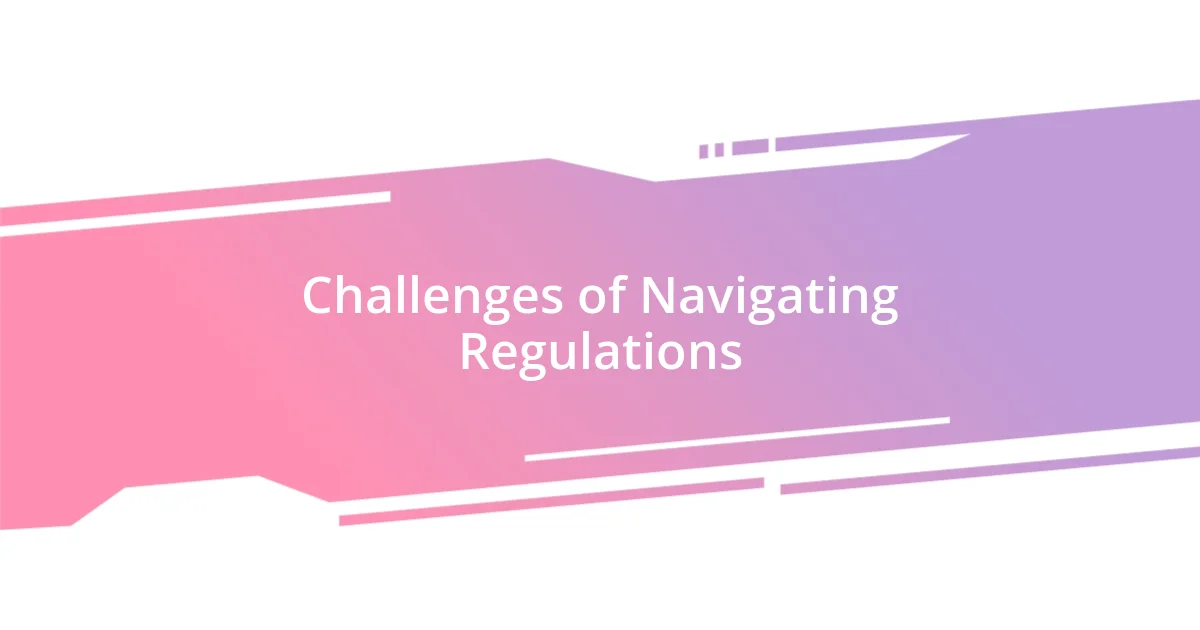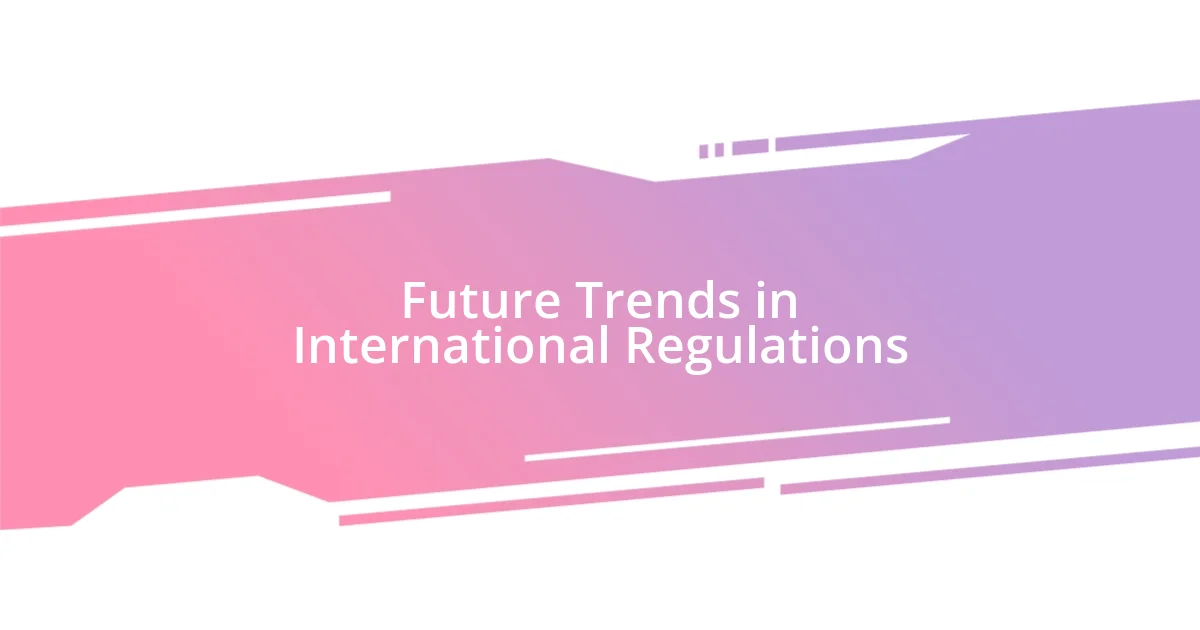Key takeaways:
- Understanding and navigating international regulations is crucial for businesses to ensure compliance, avoid penalties, and maintain reputations.
- Key regulatory bodies like WTO, ISO, and FATF play a vital role in shaping global trade practices and ensuring ethical conduct among businesses.
- Future trends indicate a focus on transparency, ethical sourcing, and leveraging technology, such as AI and data analytics, to enhance compliance strategies.

Understanding International Regulations
International regulations can be quite complex, and I often find myself reflecting on my experiences when navigating them. For instance, during a collaborative project with a team from Europe, I was struck by the differences in data protection laws, particularly the GDPR. It made me realize how critical it is to fully understand the regulatory framework we operate in, as it can impact everything from project timelines to compliance costs.
Have you ever felt overwhelmed by the sheer volume of regulations? I certainly have. In my early career, I underestimated the importance of compliance in cross-border business. It wasn’t until I faced a considerable penalty for a minor oversight that I grasped just how nuanced these regulations can be. Now, I approach each new regulation as an opportunity to refine our processes and ensure we’re not just compliant but also fostering a culture of diligence and respect for the law.
As I delve deeper into international regulations, I recognize their role as a guidepost for ethical business practices. For example, I recall a lively discussion with colleagues about the impact of trade agreements on local economies. It sparked a deeper understanding of how these regulations can either empower or restrict businesses depending on the context. Engaging in these conversations has not only informed my perspective but has also highlighted the personal responsibility we all share in adhering to these global standards.

Key International Regulatory Bodies
When I think about the major international regulatory bodies, I’m often reminded of how they shape the landscape for businesses across borders. For example, during my time attending a global compliance conference, I listened intently to a representative from the World Trade Organization (WTO). They discussed how the WTO’s frameworks not only facilitate trade but also highlight the importance of fair practices and dispute resolution among member nations. It really struck me how vital these organizations are in maintaining a sense of order in international business.
Key International Regulatory Bodies:
- World Trade Organization (WTO): Focuses on regulating international trade, ensuring that transactions are fair and equitable.
- International Organization for Standardization (ISO): Develops and publishes international standards to promote quality, safety, and efficiency.
- Financial Action Task Force (FATF): Aims to combat money laundering and terrorist financing through effective and consistent international regulations.
- International Maritime Organization (IMO): Regulates shipping practices globally to enhance maritime safety and protect the marine environment.
- Basel Committee on Banking Supervision (BCBS): Provides a framework for bank regulations to ensure financial stability across countries.
Reflecting on these bodies, I recall an incident with a financial compliance project that introduced me to FATF’s guidelines. The complexity of the regulations was daunting at first, but as I navigated through the processes, I found a sense of purpose in ensuring our financial practices aligned with international standards. It’s a reminder that these organizations are not just bureaucratic entities; they are integral in defining the rules that help maintain global market integrity.

Significance of Compliance in Business
Compliance in business is not merely a box to check; it’s a vital ingredient that ensures sustainability and trust. I remember a time when my team implemented new compliance protocols after a close call with regulatory scrutiny. The relief and stability it brought us were palpable. Knowing we were operating within the legal framework allowed us to focus on growth and innovation rather than play catch-up with regulations.
The significance of compliance goes beyond avoiding penalties; it shapes a company’s reputation and fosters stakeholder trust. Looking back, I can recall a period when a non-compliance issue caused our partner relationships to fray. Rebuilding those connections took immense effort and transparency. It taught me that businesses rooted in ethical practices and accountability tend to foster loyalty among clients and partners alike.
Finally, compliance can serve as a competitive advantage in today’s global market. I once encountered a competitor who aggressively ignored environmental regulations, which ultimately led to a scandal that tarnished their brand. In contrast, our commitment to compliance not only strengthened our market position but also attracted customers who value responsible business practices. This experience reinforced my belief that compliance isn’t just necessary; it’s a strategic asset.
| Aspect | Importance of Compliance |
|---|---|
| Risk Management | Mitigates legal and financial risks. |
| Reputation | Builds trust with clients and stakeholders. |

Challenges of Navigating Regulations
Navigating international regulations can often feel like trying to solve a complex puzzle with missing pieces. I recall a situation when I had to maneuver through contradicting regulatory frameworks between two countries for a joint venture. It was frustrating to see how certain compliance requirements clashed, making it challenging to find common ground. Have you ever felt that overwhelming sense of confusion? It’s a reality many of us face in this global landscape, where each jurisdiction pulls us in different directions.
One significant challenge is the constant evolution of regulatory standards. During a project involving data protection regulations, I found myself revisiting our compliance strategies repeatedly due to changing laws. The anxiety of keeping everything up to date was palpable, especially when deadlines loomed. It not only drained my resources but also caused a ripple effect on related teams. I recognized then just how critical it is to stay ahead of the curve—something that demands vigilance and adaptability.
Moreover, interpreting regulations can sometimes lead to unintended consequences. I learned firsthand how differing interpretations of rules could impact a business strategy. While working on an international marketing campaign, a minor misalignment in compliance details nearly led to significant penalties. The stress of that experience stayed with me, teaching me to ensure transparent communication not only within my team but also with legal advisors. How often do we consider the long-term implications of our immediate decisions? It’s a crucial lesson in the regulation game.

Strategies for Effective Compliance
Establishing a robust compliance culture starts with clear communication from the top down. I remember leading a session where I shared the real consequences of non-compliance with my team, illustrating not just the legal ramifications, but also the emotional toll it can take on our collective morale. When everyone understands the “why” behind compliance, they typically embrace their role in fostering a culture of accountability. Doesn’t it feel good to know that everyone is on the same page, working towards the same goal?
Developing a proactive compliance strategy is crucial. I learned this during a compliance audit a few years back. Instead of reacting to issues, we took the initiative to conduct regular self-assessments which revealed hidden gaps well before they became significant problems. This not only kept stress levels low but also built trust within the company. Have you explored how your organization can be more proactive in identifying compliance risks? The peace of mind it brings is invaluable.
Lastly, leveraging technology can be a game changer for compliance management. In my experience, implementing compliance software streamlined our tracking processes and significantly reduced human error. While this can feel overwhelming at first, the right tools can turn a labor-intensive process into something manageable and efficient. How often do we underestimate the power of technology in simplifying our compliance workloads? Embracing these innovations can lead to a more confident approach to meeting international regulations.

Case Studies of Successful Adaptation
When it comes to adapting successfully to international regulations, the pharmaceutical industry offers compelling case studies. I once worked with a biotech company that had to navigate complex regulatory landscapes across multiple countries. They created a dedicated cross-functional team that collaborated closely with local experts, allowing them to tailor their approach effectively. Isn’t it fascinating how much smoother processes can flow when you have the right people in the room?
In another instance, I observed a tech firm rapidly adapt to GDPR compliance after recognizing the potential backlash from non-compliance. They didn’t just tick the boxes; instead, they transformed their data privacy strategy from a legal obligation into a competitive advantage. By openly communicating their commitment to data protection to customers, they didn’t merely avoid fines—they won trust and loyalty. Have you considered how going beyond compliance can elevate your brand’s reputation?
Lastly, there’s the example of a multinational consumer goods company that faced strict environmental regulations in different regions. Instead of seeing these as obstacles, they embraced them as part of their innovation strategy. Their teams worked on sustainable product development, which not only met compliance but also resonated with consumers. I vividly remember how energized their employees felt being part of something larger than themselves, contributing to a sustainable future. Isn’t it empowering to turn challenges into opportunities?

Future Trends in International Regulations
The landscape of international regulations is evolving rapidly, with increasing emphasis on transparency and accountability. I find it intriguing how organizations are now scrutinizing their supply chains to ensure ethical sourcing. This trend not only safeguards reputations but also fosters consumer trust—who doesn’t want to support a brand that prioritizes ethical practices?
Moreover, the rise of remote work has created a unique challenge for compliance across borders. From my experience, navigating different employment laws can feel like threading a needle. I’m seeing businesses invest in comprehensive training programs that equip employees with the knowledge they need to stay compliant no matter where they work. Isn’t it fascinating how adapting to new work environments can lead to innovation in compliance strategies?
Another significant trend is the increasing use of data analytics in regulatory compliance. I remember collaborating with a firm that implemented AI-driven systems to forecast potential compliance risks. The insights they gained were not only impressive but also enabled quicker decision-making. Have you considered how data could transform your approach to international regulations? Embracing these technologies may just be the key to staying ahead in a constantly shifting regulatory environment.














